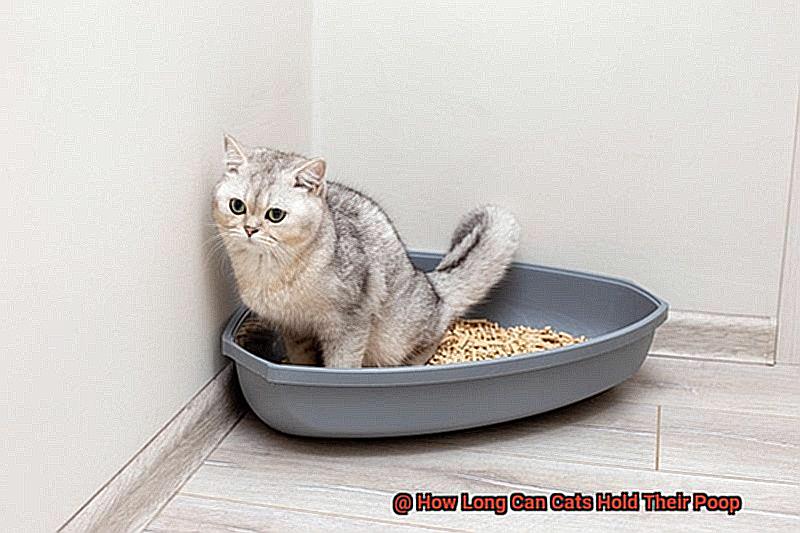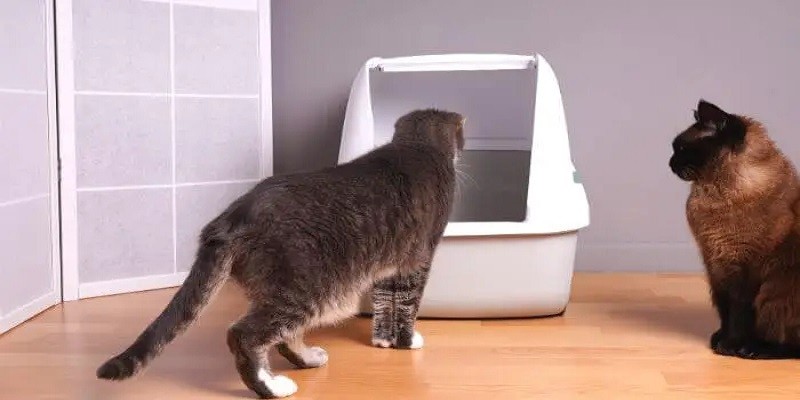Last Updated on January 14, 2025 by Pauline G. Carter
Cats can hold their poop for up to 48 hours. As a pet owner, you may be familiar with the constant need of your furry friend to relieve themselves.
While dogs need to go several times a day, you may have noticed that your cat is much more independent when it comes to their bathroom habits. You may even wonder how long they can go without using the litter box.
The truth is, cats have an exceptional ability to hold their poop for extended periods of time. However, if they go beyond 48 hours without bowel movements, it could be a sign of underlying health issues. In this article, we will dive into the factors that determine a cat’s bowel movements and what to do if you suspect any problems.

Credit: www.21cats.org
Average Time For A Cat To Poop
Feline bathroom habits are intriguing yet vital for their overall health. Do you ever wonder how long cats can hold their poop? The average time for a cat to poop can vary depending upon different factors. Let’s explore them.
Factors Affecting Feline Digestive System
A cat’s digestive system is more sensitive than humans. Here are some factors that can affect their bathroom habits:
- Diet: Cats on a high fiber diet tend to defecate more frequently than cats fed a low fiber diet.
- Age: Age-related changes in digestion can impact the frequency and consistency of bowel movements.
- Medical history: Certain health conditions such as megacolon, constipation, or inflammatory bowel disease can affect a cat’s ability to have regular bowel movements.
- Stress: Environmental changes, anxiety or illness can cause a cat’s digestive system to slow down, leading to changes in bowel movements.
How Often Should Cats Defecate?
Cats are known to be fastidious groomers, so keeping their litter box clean is crucial to their health. Generally, healthy cats defecate at least once a day. However, some cats can defecate up to three times a day, depending on their diet and metabolism.
Normal Range Of Time A Cat Should Hold Their Poop
Although different cats poop at different frequencies, generally, they can hold their poop for up to 48 hours. Nevertheless, any longer than this can pose some problems.
Consequences For Holding Feces For Too Long
If a cat holds onto their poop for too long, it can lead to constipation, loss of appetite, lethargy, and vomiting. Moreover, an unhealthy colon can cause an accumulation of feces, leading to megacolon – a severe condition that could require surgery.
Keeping track of your cat’s bathroom habits is critical. If you notice any changes in your cat’s stool, frequency or appetite, consult your veterinarian to avoid complications.
Causes Of Irregular Bowel Movements In Cats
Cats are known for their fastidious nature, and part of their self-grooming involves constantly cleaning their rear ends. But have you ever wondered how long can cats hold their poop? It’s a common question among cat owners, but the answer isn’t straightforward.
Several factors can impact your cat’s bowel movements, including their diet, health, and habits. In this post, we’ll explore the causes of irregular bowel movements in cats and what you can do to help your feline friend maintain a healthy digestive system.
Common Conditions Causing Digestive Issues In Cats
Digestive problems can be quite distressing for cats, and if left untreated, it can lead to severe health issues. Here are some common conditions that could cause digestive issues in cats:
- Inflammatory bowel disease (ibd)
- Constipation
- Colitis
- Intestinal parasites
- Food allergies or sensitivities
- Obesity
Symptoms Of Digestive Problems In Cats
It can be challenging to identify digestive problems in cats because they’re naturally private about their bathroom habits. However, you can watch out for certain signs that indicate your cat may be experiencing digestive issues:
- Diarrhea or constipation
- Loss of appetite
- Vomiting
- Lethargy
- Abdominal pain
- Dull coat
Feline Diet And Its Impact On Bowel Movements
Cats are obligate carnivores, which means they require a diet that primarily consists of meat. A balanced and nutritious diet is essential for maintaining your cat’s digestive health. Here are some things to keep in mind when it comes to your cat’s diet:
- Provide a high-quality, protein-rich diet
- Avoid giving your cat too many treats or table scraps
- Gradually transition your cat to a new diet
- Ensure your cat is getting enough water
How To Remedy Irregular Bowel Movements In Cats
If your cat is experiencing irregular bowel movements, there are several things you can do to help them:
- Schedule a visit to your veterinarian to rule out any underlying medical conditions
- Modify your cat’s diet to include more fiber or moisture
- Increase your cat’s water intake
- Encourage your cat to exercise and play more
Paying close attention to your cat’s bathroom habits and overall health is essential for their well-being. By understanding what causes irregular bowel movements in cats and incorporating healthy habits into their routines, you can help your feline friend maintain a healthy and happy life.
Frequently Asked Questions Of How Long Can Cats Hold Their Poop?
How Long Can Cats Hold Their Poop?
Cats can hold their poop for up to 48 hours, but it’s not ideal for their health.
What Happens If Cats Hold Their Poop?
If cats hold their poop for too long, they can suffer from constipation, dehydration, and other health issues.
Why Do Some Cats Hold Their Poop?
Some cats hold their poop due to anxiety, stress, changes in their environment, or medical conditions.
How Can You Help A Cat Who Holds Its Poop?
You can help your cat by providing plenty of water, healthy food, litter box care, and stress reduction.
When Should You Take Your Cat To The Vet For Holding Poop?
If your cat hasn’t pooped for over 48 hours or shows signs of discomfort or illness, take them to the vet immediately.
Conclusion
Understanding your cat’s potty habits is crucial for their overall health and wellbeing. Knowing how long your cat can hold their poop can help prevent potential health issues such as constipation, urinary tract infections, and even behavioral problems. It’s important to note that every cat is different and their bowel movements may vary based on their diet, age, and activity level.
Observing your cat’s behavior and consulting with a veterinarian can provide valuable insight into their poop habits. Regular litter box maintenance and providing a comfortable and stress-free environment can also encourage healthy potty behavior. Remember, keeping an eye on your cat’s poop may seem unpleasant but it can help maintain their digestive and urinary health which ultimately leads to a happy and healthy pet.

